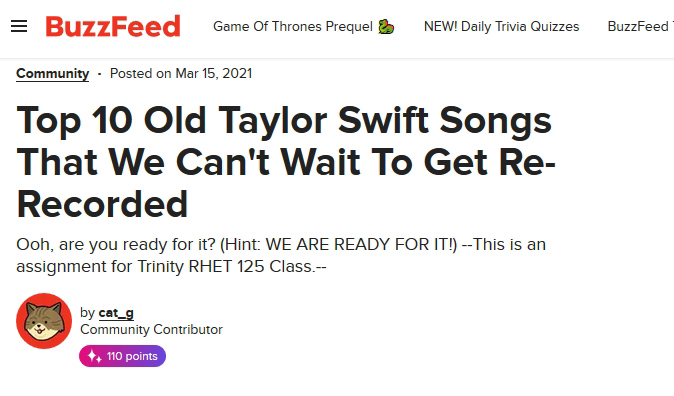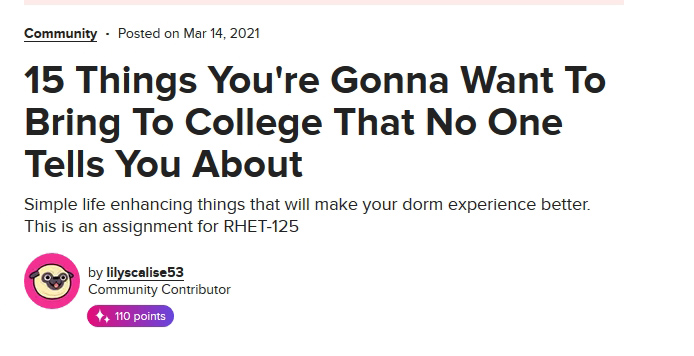Trinity’s ‘Writing for a Digital World’ Students Get Lessons from BuzzFeed Community Strategist
As the use of technology in daily life increases and more interactions take place virtually during the COVID-19 pandemic, learning how to effectively communicate online has never been more important.

That’s the focus of Trinity College’s “Writing for a Digital World” course, taught by Nicholas Marino, lecturer in the Allan K. Smith Center for Writing and Rhetoric. “My goal is for students to become more critical of the types of writing they engage with daily and how they create communities in a digital world,” said Marino.
One way in which students are taught to think critically about this subject is through a course unit that examines techniques used by the digital media company BuzzFeed. Students analyze online rhetorical situations and then demonstrate this knowledge through the creation of a BuzzFeed article.
For insight into how this is really done, Marino and his students welcomed to their virtual classroom Anna Kopsky, BuzzFeed’s community strategist. Since 2015, Kopsky has worked at BuzzFeed in numerous roles: as a writer focused on serial killers and horror movies, an editor, and a manager. Kopsky joined Marino’s course to teach “BuzzFeed Community 101,” which included tips and tricks for coming up with posts, and to answer questions from students.
“Chatting with Anna was amazing,” Marino said. “Even via Zoom, she was able to create a similar environment to the BuzzFeed office in our virtual classroom. She recreated a creative brainstorming, professional, and artistic atmosphere for us.”
 Students, including Catherine Gustofson ’24, learned how to make a “listicle,” which is an engaging piece of writing presented in the form of a list. Gustofson said, “Anna taught us listicle brainstorming techniques and the qualities of a well-written listicle.” Gustofson wrote a listicle titled, “Top 10 Old Taylor Swift Songs That We Can’t Wait To Get Re-Recorded.” Another student, Lily Scalise ’24, wrote a piece called “15 Things You’re Gonna Want To Bring To College That No One Tells You About,” which was inspired by her first-year experience at Trinity. Both articles are live on BuzzFeed’s website.
Students, including Catherine Gustofson ’24, learned how to make a “listicle,” which is an engaging piece of writing presented in the form of a list. Gustofson said, “Anna taught us listicle brainstorming techniques and the qualities of a well-written listicle.” Gustofson wrote a listicle titled, “Top 10 Old Taylor Swift Songs That We Can’t Wait To Get Re-Recorded.” Another student, Lily Scalise ’24, wrote a piece called “15 Things You’re Gonna Want To Bring To College That No One Tells You About,” which was inspired by her first-year experience at Trinity. Both articles are live on BuzzFeed’s website.
Kopsky talked to students about what her experience has been like working at BuzzFeed, as well as tips on how to find success in writing and media professions. She said, “Always bring your personality to a writing opportunity, because the beautiful thing about writing is that you can make it your own and make your words stand out and mean something.” Kopsky added, “Be open to criticism and understand that adapting to the changing landscape is truly key.”
In addition to the BuzzFeed unit, Marino’s class includes a unit called “Fact-Checking Fake News,” in which students trace a “fact” from its source and across its path on social media to investigate its validity. Finally, the unit “Is Social Media Dooming Us?” allows students to use Google docs to annotate articles about the evolution of writing technologies and write an argument-based essay on the impact of social media on society.
 Marino said, “We are interested in looking at how rhetoric operates in digital spaces, the types of tools used to compose in digital spaces, and how those tools allow for a more dynamic mode of communication. In addition, we look at how audio, visual, space, and layout all construct an image within a space to reach a purpose or audience.”
Marino said, “We are interested in looking at how rhetoric operates in digital spaces, the types of tools used to compose in digital spaces, and how those tools allow for a more dynamic mode of communication. In addition, we look at how audio, visual, space, and layout all construct an image within a space to reach a purpose or audience.”
Duncan Sopko ’23 wanted to take Marino’s course because he enjoys the creative element of writing and wanted to learn better ways to utilize writing in a digital space. “Dr. Marino is awesome, and I love how the course is not textbook-based but is focused on creativity,” said Sopko. “It is interesting learning about persuasion, rhetoric, and context, and how that all contributes to effective writing.”

Marino’s course also highlights how important flexibility is in digital writing, and he helps his students learn that skill through the course’s projects. “I really love that the projects in the course all focus on building, investigating, and constructing opinions. At the same time, I love that they are always different because of the constantly changing world of the internet. The course is constantly alive and fresh, and new ideas can emerge because of that,” Marino said. “I also always remind my students, when we are learning and utilizing a new digital resource, that it can be applied to other aspects of their academic and social lives at Trinity. These skills aren’t limited to the classroom, but extend far beyond it.”
Learn more about Trinity’s Allan K. Smith Center for Writing and Rhetoric here.
